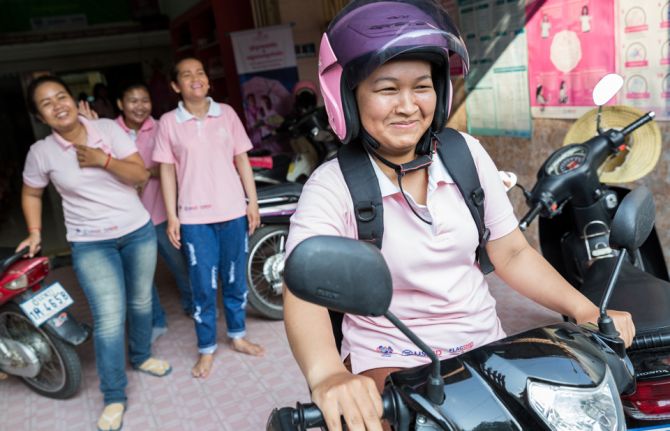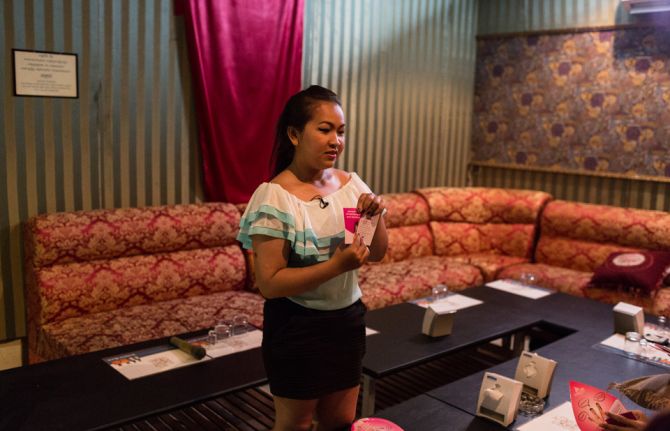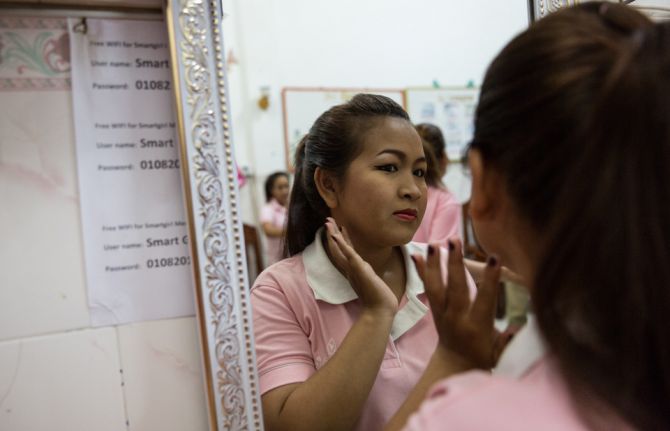




Feature Story
Bringing HIV testing to communities in Cambodia
15 November 2016
15 November 2016 15 November 2016It is nine o’clock in the evening and the night is just beginning in one popular area of Phnom Penh, Cambodia. One multistorey building offers a range of entertainment options: diners enjoy a meal on the ground floor, the bars in the middle level vibrate with popular songs and on the top floor is a hotel.
However, in one corner, next to several karaoke rooms, a serious conversation is taking place. It seems out of context amid the high-pitched laughter, strobe lights, brightly dressed women and male customers. Five entertainment workers are sitting on a sofa talking about why they don’t get tested for HIV.
One woman said, “I don’t know where to go.”
A co-worker agreed and added, “I daren’t go. I am too afraid.”
Their interviewer is 22-year-old Rath Chan Molika. She recently quit her job as an entertainment worker and is now an outreach worker and counsellor with the SMARTgirl programme. She explained why the women working in the karaoke parlour feared public health clinics. “First of all, it’s because they’re scared to go alone,” she says. “Secondly, they’re afraid of the needle and blood.”
There were an estimated 34 000 entertainment workers in Cambodia in 2015, meeting clients in hotels, karaoke parlours, beer gardens, casinos and massage parlours. Unprotected sexual relations with male customers can place some women at higher risk of HIV.
“Some go out with customers without using a condom correctly and consistently. And sometimes they use drugs together, sharing needles and syringes, which increases their risk of HIV,” said Ms Molika.
As part of her job with the SMARTgirl programme, she informs entertainment workers about how to protect themselves from HIV and other sexually transmitted infections and unintended pregnancy. While HIV peer counselling in entertainment establishments has been conducted for a few years, Ms Molika is participating in a highly innovative HIV testing programme.
When the group counselling session ends, she breaks away and in a separate room welcomes Mao Soma. The two women chat quietly for a moment. Ms Molika has been trained to provide pre- and post-HIV-test counselling and to conduct a rapid finger prick test. While Ms Soma winces as the needle pricks her finger, the procedure is over before long. Within 15 minutes there is a result, which suits Ms Soma. “The test is quick and I can get the result immediately,” she says.
Cambodia’s AIDS epidemic is concentrated in key populations
As in many other countries in the region, Cambodia’s AIDS epidemic is concentrated in key populations at higher risk of HIV, which includes entertainment workers, gay men and other men who have sex with men, transgender people and people who inject drugs.
“The government of Cambodia gives importance to collaboration with civil society and also with local people at the community level,” says Ieng Mouly, the Chair of the National AIDS Authority.
Technological innovation in HIV testing
The government, civil society partners and international organizations are now promoting rapid finger prick testing for key populations to replace traditional tests that require laboratory analysis.
“Bringing the facility close to the people is always best. People don’t have to depend on sophisticated laboratory equipment,” explains Ly Penh Sun, the Director of the National Centre for HIV/AIDS, Dermatology and STD.
“The people who are conducting the tests are familiar with the people they are testing. They can interact more. They can support each other,” says Choub Sok Chamreun, of the nongovernmental organization Khana, which provides HIV prevention, care and support services at the community level.
The need for community-based approaches
This community-based HIV testing programme is one of the first of its kind in the Asia and the Pacific region. Across the region, HIV testing coverage among key populations is low. While many countries have scaled up HIV testing in health clinics, representatives of civil society have called for more community-based approaches, focusing on key populations, who often do not attend health clinics.
The results from the Cambodian model are encouraging. Over the past year, implementers reported that more than 36 000 people from key populations were tested, 80% more than in 2014. If a person has a positive reaction on a first rapid screening test, they are accompanied by outreach workers to health facilities for confirmatory tests. Once a medical professional confirms the result, the person has access to HIV treatment.
To improve their efforts to find more people living with HIV, implementation partners are retooling the programme to intensify outreach to people at the highest risk within each key population.
“The plan is to modify the outreach guidelines to the populations at highest risk and intensify targeted outreach activity, as well as active case management, to register and retain the people who were found to be HIV-positive, to ensure they receive treatment,” says Mr Sun.



